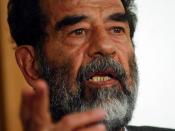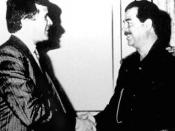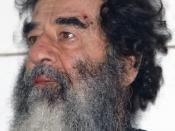Supporters of going to war against Iraq offer two very different ideals for American action. Before the shooting starts, we had better be clear about which war we're fighting. The argument for it is that Saddam Hussein is building weapons of mass destruction that he will someday use or pass on to others. In this view, Saddam will always manage to foil the outside inspections he agreed to after his defeat in 1991. We need to take him out because that is the only way we can be sure of taking out his weapons.
The second Iraq war would be a much more aggressive one. Its goal is to revolutionize the entire Middle East. If Saddam is driven from power, the idea goes; Iraqis will then build a thriving democracy. A free Iraq will become a model for Arab and Muslim nations. The Arab-Israeli dispute will become less intractable and moderation will become contagious.
The staunchest advocates of military action embrace both arguments. Their assumption is that once we get involved in a war for defensive purposes, we will have no choice but to move to the next step of occupying and rebuilding Iraq our image and leadership. But it would be a great mistake to sell the Iraq war as a defensive action when its real purpose is much broader. Here are key factors that could undermine the operation's long-term success.
Already, this has looked too much like a war in search of a justification. Advocates of taking on Saddam keep trying, almost desperately, to link him to the attacks of Sept. 11. Their case hangs almost entirely on two alleged meetings in Prague between Mohamed Atta, the leader of the hijackers, and an Iraqi agent. Since there is great dispute about whether these meetings even took place, they...


